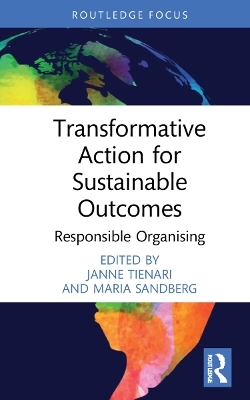
Transformative Action for Sustainable Outcomes
Routledge (Verlag)
9781032135366 (ISBN)
The text explores how different actors can responsibly organise for transformative action towards sustainable outcomes, as expressed in the United Nations Sustainable Development Goals (SDGs). Responsible refers to a reflexive understanding of how to organise in times of sustainability challenges. Organising refers to activities and practices where different actors take transformative action together. This comprehensive edited collection of short, clear, concise, and compelling chapters brings together scholars in a range of disciplines and blends theoretical perspectives to study humans and social interactions, organisations, nonhumans, and living environments. It offers topical examples from across the world and from organising of companies and other organisations, supply chains, networks, ecosystems, and markets.
The book is written for scholars and students across the social sciences and humanities as well as for practitioners working with the SDGs. It discusses complex issues in an informative and engaging way. It is critical and collaborative. The book serves as an introduction to key themes and perspectives of responsible organising and offers new insights on connections between themes and perspectives.
Maria Sandberg is a postdoctoral researcher at Hanken School of Economics, Finland. Her main research interests are sustainability transitions towards degrowth, sufficiency, and sustainable production-consumption systems. Janne Tienari is Professor in Management and Organisation at Hanken School of Economics, Finland. His research interests include gender and diversity, feminist theory, strategy work, managing multinational corporations, mergers and acquisitions, and branding, media, and social media.
Part I: A road map to responsible organising
1. Responsible organising: An introduction
2. Corporate social responsibility is useful only when it is made useful
3. Diversity must be refocused to enable responsible organising
4. Responsibility is not only about humans
Part II: Responsibility in a changing world
5. Global risks: Fundamentals are (not) changing
6. Re-emergence of geopolitics and façades of responsibility
7. Cross-sector collaborations for responsibility
8. The ecosystem approach to responsibility
9. The (ir)responsibility of organisational innovation
10. (Re)organising supply chains for responsibility
11. Responsible markets and marketing
Part III: Challenging inequalities
12. The logistification of humanitarian relief
13. "Corporate saviourism" and poverty in the Global South
14. Social media and bias 2.0
15. Intersectional inequalities and how to fight them
16. Work, care, and gendered (in)equalities
Part IV: Engaging with the nonhuman world
17: The nature-human dichotomy within disaster governance
18. Humans and water: The problem(s) with affordability
19. Human and nonhuman animals in a posthuman reality: Accreditation schemes as voice?
20. Ontological multiplicity: Responsible organising in defence of life
Part V: Responsible organising: Ways forward
21. Responsible organising: Ways forward
| Erscheinungsdatum | 19.04.2022 |
|---|---|
| Reihe/Serie | Routledge Advances in Sociology |
| Zusatzinfo | 1 Tables, black and white; 1 Line drawings, black and white; 1 Illustrations, black and white |
| Verlagsort | London |
| Sprache | englisch |
| Maße | 138 x 216 mm |
| Gewicht | 280 g |
| Themenwelt | Naturwissenschaften ► Biologie ► Ökologie / Naturschutz |
| Sozialwissenschaften ► Soziologie ► Spezielle Soziologien | |
| Wirtschaft ► Betriebswirtschaft / Management ► Marketing / Vertrieb | |
| Wirtschaft ► Volkswirtschaftslehre | |
| ISBN-13 | 9781032135366 / 9781032135366 |
| Zustand | Neuware |
| Informationen gemäß Produktsicherheitsverordnung (GPSR) | |
| Haben Sie eine Frage zum Produkt? |
aus dem Bereich


